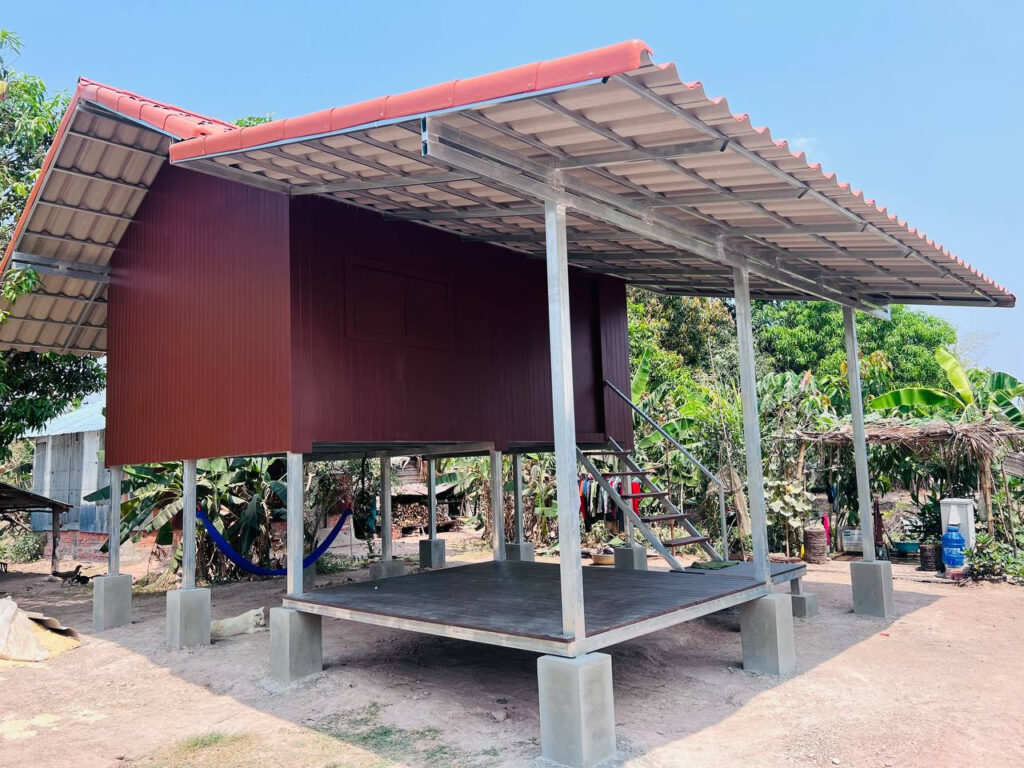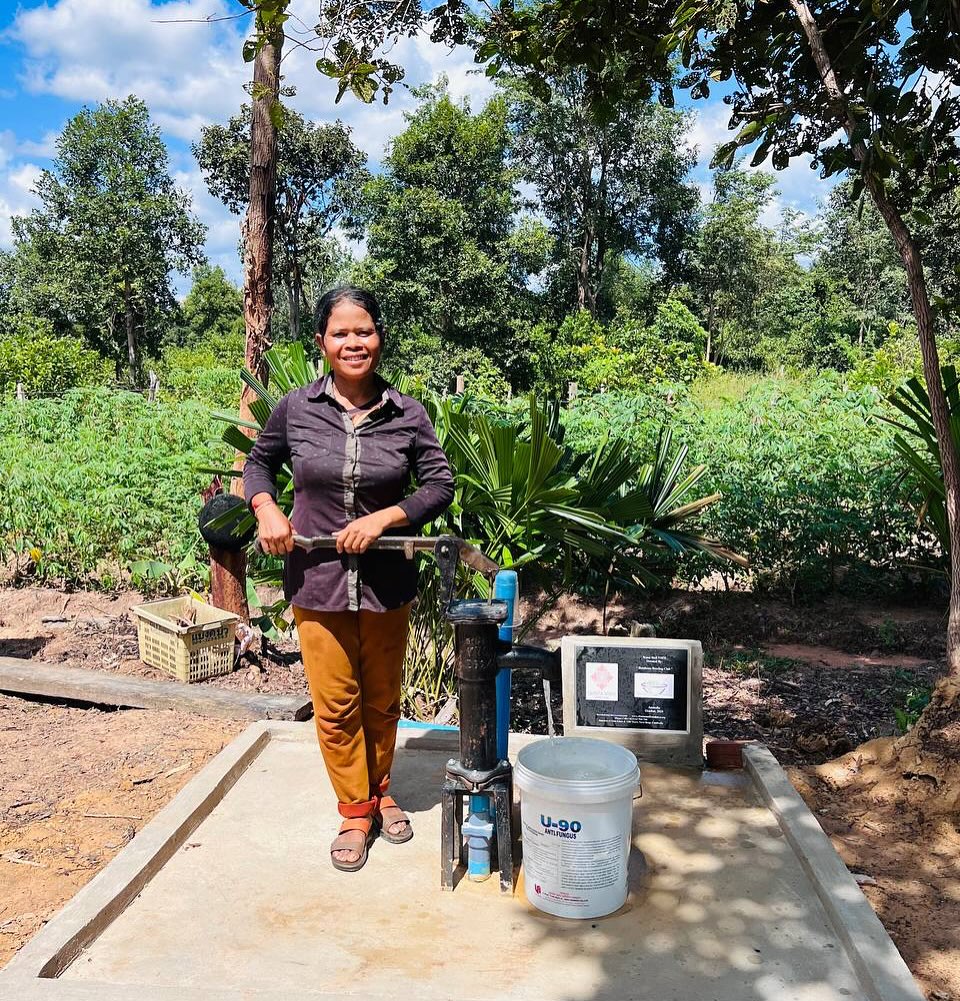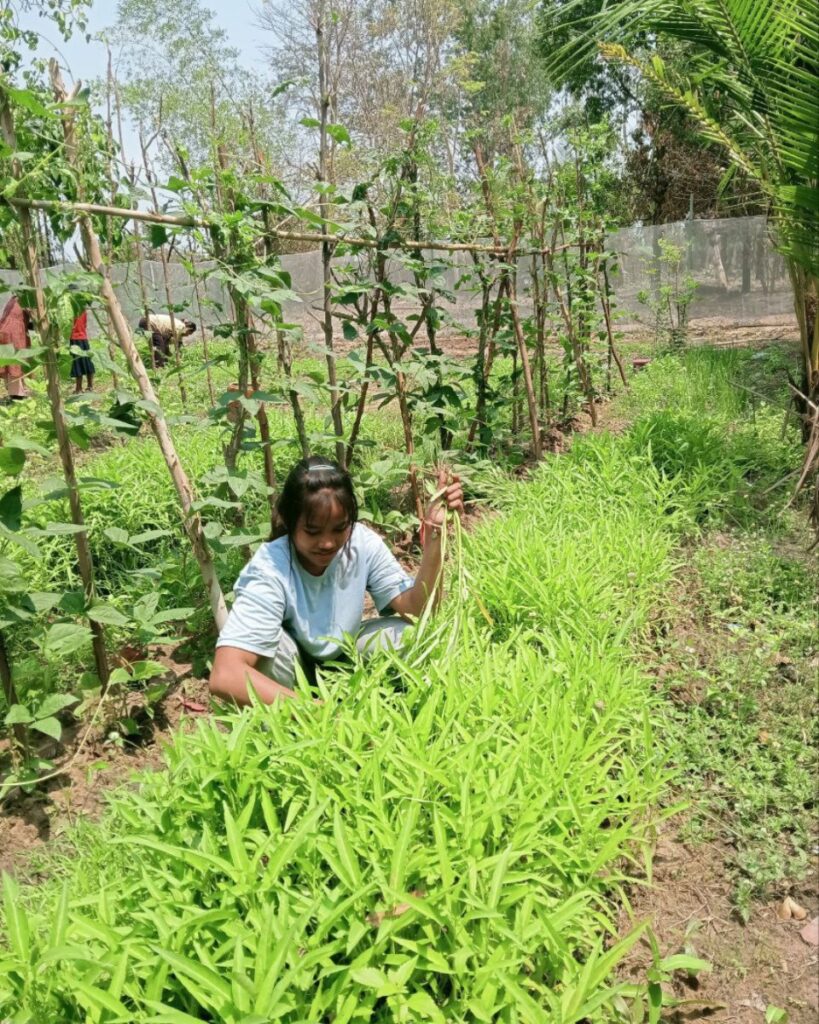supporting those in need
Clean water and good sanitation are very important for health. With help from partners around 1,200 water wells have been dug in Cambodian villages. These wells give people clean drinking water close to their homes.
To improve hygiene, toilets and handwashing areas have been built in schools and villages. Children and families can now use clean toilets, which helps stop the spread of disease. Sanitation blocks and clean water stations also help people stay healthy.
In some places, small playgrounds were built for children to play safely. Canning buildings were also added to help families keep food fresh for longer. To support farming and daily life, families received chicken coops and vegetable gardens. These help them grow food and earn some money.
Houses have also been built for families who had no safe place to live. These strong houses give children and parents better protection and a more hopeful future.
This support helps improve life in the countryside. Clean water, better toilets, food gardens, and safe homes all make life healthier and stronger for families in rural areas.
____________________
Vocabulary:
- Sanitation – Having clean places to wash, go to the toilet, and remove waste so people stay healthy.
- Health – The condition of your body and mind; being free from illness or feeling well.
- A water well – A deep hole in the ground where people can get water.
- To dig (dug, dug) – To make a hole in the ground using your hands or a tool.
- To improve hygiene – To make habits and conditions cleaner so people don’t get sick.
- Clean – Not dirty; free from dust, germs, or waste.
- To spread – To move from one place or person to another.
- A disease – An illness that makes people or animals sick.
- A sanitation block – A small building with toilets and places to wash for many people to use.
- To stay healthy – To continue feeling well and not get sick.
- A playground – An outdoor area where children can play.
- To play safely – To enjoy games or activities without getting hurt.
- A canning building – A place where people put food in jars or cans to keep it for a long time.
- To keep food fresh – To stop food from going bad too quickly.
- To support farming – To help people grow food or take care of animals.
- To receive – To get something that is given to you.
- A coop – A small house where chickens or other animals live.
- Vegetables – Plants like carrots, tomatoes, and beans that people eat.
- To earn money – To get money by working or doing something useful.
- Protection – Being safe from danger, illness, or bad weather.
- A hopeful future – A good life that may come later; believing life will be better.
- A rural area – The countryside; a place far from cities, with farms and small villages.
###################
Multiple choice questions, with only one correct answer
- What is a water well used for?
A) To store food
B) To get clean water from the ground
C) To play games - What does to dig mean?
A) To build a house
B) To make a hole in the ground
C) To carry heavy things - What is sanitation about?
A) Growing vegetables
B) Playing safely
C) Having clean toilets and washing areas - Why do people want to improve hygiene?
A) To cook faster
B) To stay healthy
C) To walk to school - What is the meaning of clean?
A) New and cheap
B) Not dirty
C) Very big - What does to spread mean?
A) To give something to many people or places
B) To hide something
C) To stop something quickly - A disease is:
A) A type of plant
B) A game children play
C) An illness that makes people sick - Where do many people use toilets and wash their hands together?
A) In a playground
B) In a sanitation block
C) In a vegetable garden - Why is it important to stay healthy?
A) To play more games
B) To avoid getting sick
C) To build new houses - What do children do in a playground?
A) Wash clothes
B) Learn to read
C) Play and have fun - What does it mean to play safely?
A) To play without getting hurt
B) To play in the rain
C) To play at night - A canning building is a place where people:
A) Cook fresh meals
B) Put food in jars or cans
C) Grow rice and corn - Why do people keep food fresh?
A) To make it taste bad
B) To throw it away later
C) To eat it later without it going bad - What does to support farming mean?
A) To help grow food and take care of animals
B) To play on the farm
C) To clean the house - What does it mean to receive something?
A) To give something
B) To get something
C) To buy something - What is a coop used for?
A) For growing flowers
B) For washing vegetables
C) For keeping chickens - Which of these is a vegetable?
A) Carrot
B) Cookie
C) Chicken - What does to earn money mean?
A) To lose money
B) To get money by working
C) To hide money - What is protection?
A) Something that keeps you safe
B) A kind of game
C) A way to cook food - What is a rural area?
A) A big city
B) A place with many shops
C) The countryside, with farms and small villages
_____________________
Answers:
1 B, 2 B, 3 C, 4 B, 5 B, 6 A, 7 C, 8 B, 9 B, 10 C, 11 A, 12 B, 13 C, 14 A, 15 B, 16 C, 17 A, 18 B, 19 A, 20 C
######################
Match the word with Its definition
Words:
- Sanitation
- Health
- Water well
- To dig
- Hygiene
- Clean
- Disease
- Sanitation block
- Playground
- Canning building
- Vegetable
- Coop
- To earn money
- Protection
- Rural area
Definitions:
A. A deep hole where people get water from the ground
B. A small house where chickens live
C. The condition of being free from illness
D. The countryside with farms and small villages
E. To make a hole in the ground
F. A place for children to play safely outside
G. Having clean toilets and washing places to keep people healthy
H. To get money by working
I. Not dirty or full of germs
J. A type of food like carrots and tomatoes
K. A building to put food in jars or cans to keep it fresh
L. An illness that makes people sick
M. Something that keeps people safe from harm
N. The practice of keeping clean to avoid sickness
O. A small building with toilets and washing places
Answers:
1 G, 2 C, 3 A, 4 E, 5 N, 6 I, 7 L, 8 O, 9 F, 10 K, 11 J, 12 B, 13 H, 14 M, 15 D
###################

Gap-Fill Exercise
- Good _______ means having clean toilets and washing places.
a) protection
b) sanitation
c) digging - When people feel well and do not get sick, they have good _______.
a) health
b) disease
c) playground - A _______ is a deep hole people dig to get clean water.
a) vegetable
b) coop
c) water well - Farmers _______ the ground to plant crops or find water.
a) dig
b) spread
c) receive - To _______ hygiene means to make cleaning habits better.
a) improve
b) earn
c) keep - If something is _______ it is not dirty or full of germs.
a) clean
b) healthy
c) safe - A _______ can move quickly from one person or place to another.
a) disease
b) vegetable
c) protection - A _______ is a building with toilets and washing places for many people.
a) sanitation block
b) playground
c) coop - To _______ healthy means to avoid getting sick.
a) stay
b) dig
c) spread - A safe place outside where children can play is called a _______.
a) vegetable
b) playground
c) sanitation block - A _______ is a building to keep food fresh in jars or cans.
a) sanitation block
b) canning building
c) coop - Farmers grow _______ like carrots, beans, and tomatoes to eat.
a) diseases
b) vegetables
c) protections - A small house where chickens live is called a _______.
a) garden
b) coop
c) well - People work to _______ money to buy things they need.
a) spread
b) keep
c) earn - When someone gives you something, you _______ it.
a) receive
b) improve
c) dig - _______ means being safe from danger or harm.
a) Hygiene
b) Protection
c) Digging - When you believe in a better life ahead, you have a _______ future.
a) hopeful
b) dirty
c) small - A _______ area is the countryside with farms and few buildings.
a) clean
b) healthy
c) rural
_______________________
1 b, 2 a, 3 c, 4 a, 5 a, 6 a, 7 a, 8 a, 9 a, 10 b, 11 b, 12 b, 13 b, 14 c, 15 a, 16 b, 17 a, 18 c
#####################

Gap-Fill Exercise – no words given
- Clean water and good _______ are very important for health.
- Around 1,200 water _______ have been dug in Cambodian villages.
- These wells give people clean drinking water close to their _______.
- To improve _______, toilets and handwashing areas have been built.
- Clean toilets help stop the spread of _______.
- Sanitation blocks and clean water stations help people stay _______.
- Small _______ were built for children to play safely.
- _______ buildings help families keep food fresh for longer.
- Families received chicken _______ and vegetable gardens to support farming.
- These help families grow food and _______ some money.
- Houses have been built for families who had no safe _______ to live.
- Strong houses give better protection and a more _______ future.
- Clean water, better toilets, food gardens, and safe homes improve life in _______ areas.
___________________________
Answers:
1 sanitation, 2 wells, 3 homes, 4 hygiene, 5 disease, 6 healthy, 7 playgrounds, 8 canning, 9 coops, 10 earn, 11 place, 12 hopeful, 13 rural
##################
Interview with a staff member of the foundation – complete, words below:
1.
Q: What does your foundation do?
A: We help villages in Cambodia by providing __________ water, toilets, and other important things.
2.
Q: How many water wells have you helped to dig?
A: We have helped dig about 1,200 water wells in rural __________.
3.
Q: Why are water wells important?
A: Water wells give people clean drinking water close to their __________.
4.
Q: What else do you build besides water wells?
A: We build toilets, __________ areas, playgrounds, and canning buildings
5.
Q: How do toilets help the community?
A: Clean toilets help stop the spread of disease and improve __________.
6.
Q: What is a __________ block?
A: It is a building with toilets and washing places for many people.
7.
Q: Why are playgrounds important?
A: Playgrounds give children a __________ place to play outside.
8.
Q: What do canning buildings do?
A: They help families keep food __________ for a longer time.
9.
Q: How do chicken __________ and vegetable gardens help families?
A: They help families grow food and earn some money.
10.
Q: Do you also help with __________?
A: Yes, we build strong houses for families without safe homes.
11.
Q: How does your work help rural areas?
A: Our work __________ health and life for families in the countryside.
12.
Q: What is your hope for the future?
A: We hope for a healthy and hopeful __________ for all families we help.
_______________________
sanitation – safe – improves – villages – coops – clean – housing – homes – handwashing – future – fresh – health
________________________
Answers:
1.
Q: What does your foundation do?
A: We help villages in Cambodia by providing clean water, toilets, and other important things.
2.
Q: How many water wells have you helped to dig?
A: We have helped dig about 1,200 water wells in rural villages.
3.
Q: Why are water wells important?
A: Water wells give people clean drinking water close to their homes.
4.
Q: What else do you build besides water wells?
A: We build toilets, handwashing areas, playgrounds, and canning buildings.
5.
Q: How do toilets help the community?
A: Clean toilets help stop the spread of disease and improve health.
6.
Q: What is a sanitation block?
A: It is a building with toilets and washing places for many people.
7.
Q: Why are playgrounds important?
A: Playgrounds give children a safe place to play outside.
8.
Q: What do canning buildings do?
A: They help families keep food fresh for a longer time.
9.
Q: How do chicken coops and vegetable gardens help families?
A: They help families grow food and earn some money.
10.
Q: Do you also help with housing?
A: Yes, we build strong houses for families without safe homes.
11.
Q: How does your work help rural areas?
A: Our work improves health and life for families in the countryside.
12.
Q: What is your hope for the future?
A: We hope for a healthy and hopeful future for all families we help.
